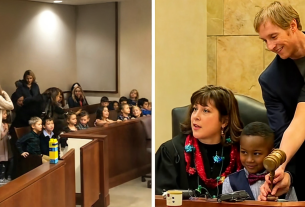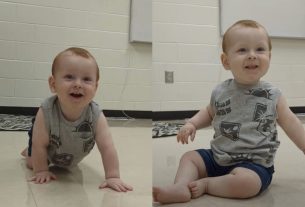Marina drew a deep breath, feeling her heart beat just a little faster than usual. She adjusted the sleeve of her dark-blue silk dress—it hugged her figure like a second skin, tracing every line with refined elegance. In the mirror looked back a woman striving to be faultless not only in appearance, but in her actions. The pearl earrings Andrey had given her for their wedding anniversary shimmered softly in the lamplight, lending her look a note of grace and dignity. Today was special—Vera Petrovna’s sixtieth birthday, her mother-in-law, with whom Marina had once had warm, almost motherly relations. She wanted this evening to be a celebration of love, respect, and recognition. She wanted to show that she valued not just the kinship, but the person.
Quick footsteps sounded behind her, and Andrey appeared in the doorway—tall, put-together, a slight smile on his lips as he straightened his tie before they left. His gaze swept over his wife, and admiration flickered in his eyes.
“Marish, are you ready?” he asked, coming closer. “Mom’s already called twice. She says the guests are starting to arrive.”
“Almost,” Marina replied, taking a neatly wrapped parcel from the vanity. The paper gleamed with golden patterns, and the ribbons had been tied with such care that it felt as if each element of the gift carried a piece of the soul. “Are you sure we’re doing the right thing?”
Andrey stepped in, wrapped an arm around her waist, and drew her close. His warmth, his presence, always calmed her.
“Of course,” he whispered. “Just imagine how surprised she’ll be when she finds out she’s getting a new refrigerator. And your painting… it’s a masterpiece! It’s not just a gift—it’s memory, it’s love, it’s home. Mom will feel that.”
Marina tightened her grip on the parcel. There was a slight tremor in her fingers—not from fear, but from tension. Three weeks earlier she and Andrey had argued for a long time about what to give Vera Petrovna. The old refrigerator that had stood in her kitchen for twenty years had long since become a source of problems: the door no longer shut properly, the freezer had stopped working, and the compressor droned like a roused beehive, keeping even the next room awake. Marina had insisted on replacing it—not just with a new one, but with a large, modern model with a digital display, No Frost system, and spacious shelves. It was a serious stretch for their household budget. A recent renovation of their son’s room had left a dent in their wallet, but Marina believed that if they were going to give a present, it should be done properly—with scope, with care.
“But you can’t bring a refrigerator to a birthday party,” Andrey had laughed, shaking his head. “Picture it: we walk into the apartment, and behind us come the movers with the appliance. The guests will think it’s not a milestone birthday, but a move.”
“Then we’ll give her something heartfelt first,” Marina had replied. “I’ll paint her a picture. And then—the surprise. Let there be two gifts: one from the heart, and one from the head.”
And she had set to work. Every evening, after putting their son to bed and tidying the house, she sat down at the easel and recalled summer days at her mother-in-law’s dacha. That old little house with carved window frames, the porch twined with grapevines, the apple trees blooming in May like fairy-tale lanterns—all of it lived in her memory like a vivid photograph. The watercolor came out warm, sunlit, suffused with light and tenderness. Every brushstroke was not just color, but emotion; not just a line, but a memory. She poured everything into the painting: love, respect, gratitude for the years they had shared.
But in recent months everything had been changing. Vera Petrovna had grown sharper, more irritable. Remarks about how they were raising her grandson, criticism of the borscht Marina cooked by her own recipe, hints that “in our day wives knew how to run a household.” Andrey comforted her: “It’s age, loneliness—she just needs support.” Marina tried, endured, smiled—but inside the tension coiled like a spring ready to snap at any moment.
“Let’s go, or we’ll be late,” Andrey said, picking up the keys. “Let’s not spoil Mom’s celebration from the very start.”
On the way they stopped at a flower shop. Marina chose a lush arrangement of white and scarlet roses—symbols of purity and passion, of life and remembrance. A gentle fragrance filled the car, mingling with the scent of leather seats and autumn air. Outside, the streets of the old district flickered past—buildings with stucco, trees losing their leaves, streetlights kindling in the dusk. Everything felt familiar as childhood.
“Do you think she’ll have any inkling about the refrigerator?” Marina asked as they climbed the stairs to the third floor.
“How would she?” Andrey smirked. “We didn’t drop a single hint. It’ll be a real surprise.”
The door swung open, and there stood Vera Petrovna. Sixty years old, but she looked ten years younger: neat coiffure, light makeup, an elegant black dress with tiny beads at the collar. But in her eyes—alarm flashed like lightning when she saw Marina.
“Andryusha!” she exclaimed, embracing her son. “How happy I am!” And to Marina—she gave a restrained, almost formal kiss on the cheek. “Come in, the guests are already here.”
The apartment had been transformed. The table was laid with ceremonial solemnity: antique porcelain, crystal goblets, platters of appetizers, pies, salads—everything looked like something out of a magazine. The air was saturated with the scents of wine, baking, and flowers. It was clear Vera Petrovna had prepared for this day for a long time, with a tremor, as for an important milestone.
Guests—colleagues, neighbors, distant relatives—were already seated, chatting and laughing. Marina nodded and smiled, but felt out of place. It seemed everyone was judging her, though no one said a word. Andrey held her hand, as if shielding her.
“My dears,” Vera Petrovna rose, holding a glass, “thank you for coming. Sixty is not just a number. It is life. It is memory. It is love.”
The guests stood, and the clinking of glasses filled the room. Vera Petrovna smiled, but Marina noticed how often she lifted her glass—too often.
“Vera Petrovna,” Marina stood with the gift in her hands. “We’d like to congratulate you as well. From the bottom of our hearts.”
Silence. Every gaze turned to her. Her heart pounded in her temples.
“This is from Andrey and me,” she said, offering the parcel. “With love.”
Her mother-in-law unwrapped the paper. She saw the painting. Her face changed at once. Her brows drew together; her lips tightened.
“This is… what?” She held up the watercolor. “Is this supposed to be a joke?”
“Marina painted it especially for you,” Andrey said proudly. “Remember our little dacha? How we…”
“How dare you?” Vera Petrovna shrieked. “To come to my milestone birthday with this… daub? I spent more on the food than you did on this gift!”
Marina went cold. Andrey froze.
“Mom, what are you saying?” He tried to take her hand.
“Don’t touch me!” She jerked away. The alcohol had stripped away every brake. “Did you think I didn’t deserve a real gift? You gave me a piece of paper with scribbles! You were too stingy with money! Waiting for me to die so you can get the apartment! You’ve turned my son against his own mother!”
The guests were motionless. Some dropped their eyes; others stared at the floor. An awkward hush hung in the air like fog.
“Vera Petrovna,” Marina began quietly, “I painted this for three weeks. Every evening. It’s my home. Our home.”
“Be quiet!” she cut her off. “You don’t love me! You never wanted to be part of this family!”
Andrey tried to stop his mother, but she was a storm.
“My son would never have given me something like this before!” She brandished the painting. “And now? You decided to cut corners?”
“Enough, Mom!” Andrey shouted. “You don’t understand!”
“I understand everything!” She downed her glass in one swallow. “I understand that this is all I rate now from my own son!”
Marina stood up without a word. She took out her phone. Her hands trembled, but her voice was steel.
“Hello, delivery service? Yes, this is Marina Koltsova. The Bosch refrigerator, tomorrow, 15 Mira Street, apt. 23. I’m canceling the order. Yes. Thank you.”
Silence. Absolute, resonant.
“What… refrigerator?” Vera Petrovna turned slowly.
“A good one—large, modern,” Marina put the phone away. “The one we’ve been choosing for you these three weeks. Your main present. And the painting… that was from the heart. So you would have something right away.”
The color drained from Vera Petrovna’s face. She sank into a chair, still clutching the watercolor.
“But… I didn’t know…”
“You didn’t,” Marina repeated. “But that didn’t stop you from humiliating me in front of everyone. From calling me stingy. From saying I’m waiting for your death to get the apartment.”
“Marinochka…” her mother-in-law tried to rise. “I… I’d had a drink… I didn’t mean…”
“A drunk says what the sober thinks,” Marina fastened her coat. “Andrey, let’s go.”
Andrey looked at his mother, then at his wife. Pain filled his eyes. He took Marina’s hand.
“Mom, you’ve ruined everything,” he said quietly. “Marina spent a month painting that picture. And the refrigerator… we spent our last money on it.”
They headed for the door. The guests sat like statues. Only Aunt Lyusya cried softly.
“Wait!” shouted Vera Petrovna. “It’s my birthday! Don’t go!”
“Now your fears have come true,” Andrey said. “Happy birthday, Mom.”
The door closed. Their footsteps faded on the stairs.
Vera Petrovna sat alone in the middle of a celebration that was no longer a celebration. In her hands—the painting. She looked at it. And for the first time she saw: every stroke was love. Every color—memory. Every detail—a home she herself had once created.
“I ruined everything,” she whispered.
Rain fell outside the window. The guests had gone. She remained alone. With a phone she didn’t dare dial. With a painting she didn’t deserve. With a refrigerator that would no longer arrive.
And with understanding—the bitterest gift of her life.
Because the main loss wasn’t the refrigerator.
The main loss was trust. And the heart she had broken.



